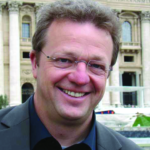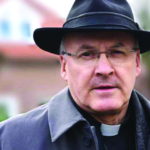The themes of the process are “encounter, listen, and discern.” But some warn that the process is flawed…
By CNA (a service of EWTN News)

Pope Francis visits a Roman parish in the southern suburbs of the city, meeting the children and young people of the parish (Photo Grzegorz Galazka)
Pope Francis formally launched the two-year global consultation process leading to the 2023 “Synod on Synodality” on Sunday, October 10, with a call to “look others in the eye and listen to what they have to say.”
Preaching at a Mass at St. Peter’s Basilica, the Pope said Catholics taking part in the “synodal path” should strive to “become experts in the art of encounter.”
“Not so much by organizing events or theorizing about problems, as in taking time to encounter the Lord and one another,” he said.
“Time to devote to prayer and adoration — this prayer that we neglect so much: to adore, to make room for adoration — listening to what the Spirit wants to say to the Church.
“Time to look others in the eye and listen to what they have to say, to build rapport, to be sensitive to the questions of our sisters and brothers, to let ourselves be enriched by the variety of charisms, vocations, and ministries.”
The live-streamed Mass, attended by some 3,000 people, was the second of two weekend events officially opening the two-year global consultation process.
The first was a “moment of reflection” on October 9 featuring speeches from the Pope, Cardinal Mario Grech, the secretary general of the Synod of Bishops, Cardinal Jean-Claude Hollerich, S.J., the synod’s relator general, and others.
The Vatican announced in May that the “Synod on Synodality” would open with a diocesan phase lasting from October 2021 to April 2022.
A second, continental phase will take place from September 2022 to March 2023.
The third, universal phase will begin with the XVI Ordinary General Assembly of the Synod of Bishops, dedicated to the theme “For a Synodal Church: Communion, Participation, and Mission,” at the Vatican in October 2023.
In his homily, the Pope reflected on the day’s Gospel reading, Mark 10:1730, in which Jesus challenges the rich young man to “Go, sell what you have, and give to the poor… then come, follow me.”
He said that the Gospels often showed Jesus in the midst of a journey, meeting people and listening to their deepest concerns.
“Today, as we begin this synodal process, let us begin by asking ourselves — all of us, pope, bishops, priests, religious and laity — whether we, the Christian community, embody this ‘style’ of God, who travels the paths of history and shares in the life of humanity,” he urged.
“Are we prepared for the adventure of this journey? Or are we fearful of the unknown, preferring to take refuge in the usual excuses: ‘It’s useless’ or ‘We’ve always done it this way’?”
“Celebrating a synod means walking on the same road, together. Let us look at Jesus, who encounters the rich man on the road; he then listens to his questions, and finally he helps him discern what he must do to inherit eternal life.”
The Pope built his homily around three verbs — “encounter, listen, and discern” — that he hoped would mark the synodal path.
He noted that when Jesus encountered the young man, he was fully present to him and did not “keep looking at his watch to get the meeting over.”
“Everything changes once we are capable of genuine encounters with Him and with one another, without formalism or pretense, but simply as we are,” he observed.
“Do we allow people to express themselves, to walk in faith even though they have had difficulties in life, and to be part of the life of the community without being hindered, rejected, or judged?” he asked. He continued: “Participating in a synod means placing ourselves on the same path as the Word made flesh. It means following in his footsteps, listening to his word along with the words of others. It means discovering with amazement that the Holy Spirit always surprises us, to suggest fresh paths and new ways of speaking.” The Pope said that encounter and listening should lead to discernment.
“We see this in today’s Gospel,” he explained. “Jesus senses that the person before him is a good and religious man, obedient to the commandments, but he wants to lead him beyond the mere observance of precepts.”
“Through dialogue, he helps him to discern.“
Jesus encourages that man to look within, in the light of the love that the Lord himself had shown by his gaze, and to discern in that light what his heart truly treasures.”
“And in this way to discover that he cannot attain happiness by filling his life with more religious observances, but by emptying himself, selling whatever takes up space in his heart, in order to make room for God.”
The Pope described the synod as “a journey of spiritual discernment” guided by God’s word. “That word summons us to discernment and it brings light to that process. It guides the synod, preventing it from becoming a Church ‘convention,’ a study group or a political congress, because it is not a parliament, but rather a grace-filled event, a process of healing guided by the Holy Spirit,” he said. “In these days, Jesus calls us, as he did the rich man in the Gospel, to empty ourselves, to free ourselves from all that is worldly, including our inward-looking and outworn pastoral models; and to ask ourselves what it is that God wants to say to us in this time. And the direction in which he wants to lead us.”
Synodal Path in Germany an “abuse of the Church”
Germany began a “synodal path” of its own in 2020. Two participants say the process betrays a “total failure of catechesis.” Might Germany’s experience foreshadow the Vatican’s Synod on Synodality?
The Synodal Path of the Catholic Church in Germany is dominated by “indignant laypeople” who are ensuring their “radical demands” are met by making them look more moderate.
 This is according to an assessment written by two anonymous synodal lay participants and shared with Bernhard Meuser (photo), Catholic publisher and co-founder of “Neuer Anfang” (New Beginning), a group critical of Germany’s “Synodal Path.”
This is according to an assessment written by two anonymous synodal lay participants and shared with Bernhard Meuser (photo), Catholic publisher and co-founder of “Neuer Anfang” (New Beginning), a group critical of Germany’s “Synodal Path.”
Meuser, who also founded the YOUCAT Foundation for the New Evangelization in Bavaria, told the National Catholic Register on October 6 that according to these members of the Synodal Path, the process is an “abuse of the Church, the forcible appropriation of power by liberal forces and their domination of the process.”
The German Synodal Path, which began in January 2020 and is slated to end in 2023, aims to tackle key areas of reform highlighted by the clerical sex abuse crisis, say organizers.
The two disaffected participants wished to remain anonymous because they wanted to continue “to have a say within the process” and did not want “the thread of conversation to break off,” said Meuser, who believes they reflect the full “horror” and “terrible things happening there.”
The participants noted that the Central Committee of German Catholics (ZdK), source of most of the lay participants in the Synodal Path process, is made up of “mostly left-liberal functionaries of associations, committees and federations” who are “by no means the entirety of the laity in Germany.”
 The bishops, they added, fall into three groups: those who support the demands of the lay members; a few loyal to the Magisterium led by the theological head of the bishops’ conference, Bishop Rudolf Voderholzer (photo); and the majority of the episcopate, “who remain silent and tremble.” Each bishop has only one vote, the same as each lay participant, and the same applies to the speaking time they are allotted.
The bishops, they added, fall into three groups: those who support the demands of the lay members; a few loyal to the Magisterium led by the theological head of the bishops’ conference, Bishop Rudolf Voderholzer (photo); and the majority of the episcopate, “who remain silent and tremble.” Each bishop has only one vote, the same as each lay participant, and the same applies to the speaking time they are allotted.
For these two synod informants, behind this Synodal Path is “a total failure of catechesis in the German Church for 50 years,” along with the “simultaneous emancipation of wide circles of academic theology away from the teaching authority of the Church.”
Despite the process having no canonical authority, the two members warned of schism.
The next synodal assembly, they pointed out, plans to make “binding decisions by majority vote” and they are not optimistic that courageous bishops will oppose them, especially as only a slim majority of the bishops attended the most recent synodal assembly, September 30-October 2.
—By Edward Pentin, National Catholic Register





Facebook Comments